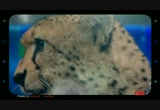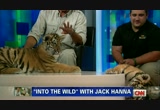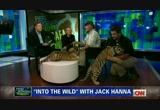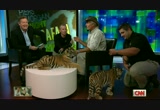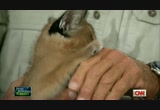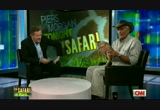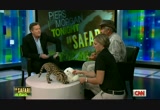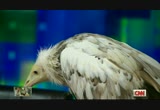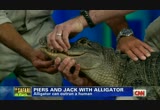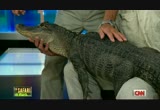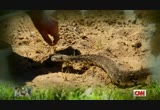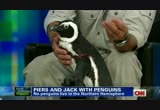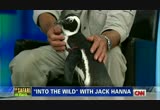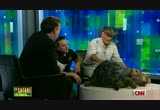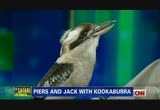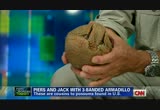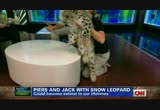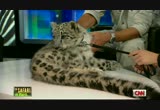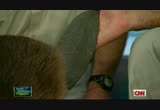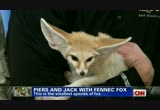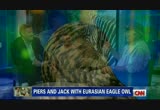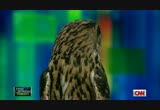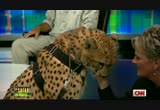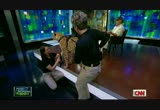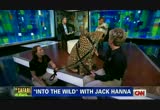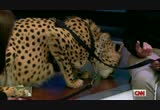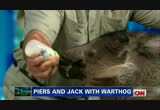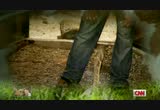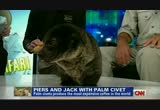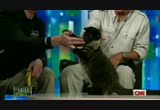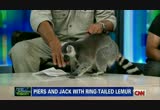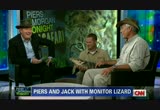tv Piers Morgan Tonight CNN November 24, 2012 12:00am-1:00am PST
12:00 am
and they didn't. >> reporter: all he wants, he says, is the truth. nic robertson, cnn, ireland. >> thanks for joining us. i'm tom foreman. okay, stand by, piers. >> things have got pretty wild with some of my guests but nothing quite like this. what the hell's that? my studio's turned into a jungle. whoa! jack, am i going to die here? oh, my god, what's this? tonight, the one and only jack hanna and a few of his closest friends. >> he defecates on his legs to keep them cool. >> you know what, jack, too much information. >> if he bites you, it won't hurt bad. >> you won't believe this. this is the only one in the world to carry leprosy. >> now you tell me. >> never quite know what will happen next when jack hanna's in the house. he's got my notes. >> i'm sorry. that your notes?
12:01 am
>> this is a very dangerous edition of "piers morgan tonight." good evening. welcome to a special "piers morgan tonight." as you can see, the studio looks a little different tonight. trust me, so will my guests that will be here over the course of the hour. we're talking cheetahs, foxes, owls, kimodo dragons. i'm here with jack hanna, where anything can happen. jack hanna is director of the columbus zoo and aquarium and also the host of the emmy award winning jack hanna's into the wild and a new show called wild countdown. his tigers are literally eating my studio. we better get on with this. welcome. am i going to die here? >> shouldn't die but if you were going to die, these are the animals that would do it. >> these are baby tigers? how old are they? >> siberian tigers, 13 weeks. >> at what age can they kill a man? >> about another 22 months. >> right. >> because at about 22 months, these animals weigh over 600 pounds. >> really? >> this is one of the rarest cats in the world, piers.
12:02 am
there are less than some people say 400. there could be less than 200 left in that part of the world. they were hunted for their coats but the problem today, you can imagine this animal at 600 pounds. >> they look strong already. >> they are very strong. they can literally put a hole through your arm right now. >> right. looks like he wants to. can they bite at this age? >> oh, yeah. they learn from each other. these animals are a species survival plan. what they are, they have chips in them. this animal, it could be another three to six months, could go to a zoo in europe, australia, wherever it might be, that's an accredited zoo for the gene pool to keep them fresh because these animals are so rare that we have to know exactly what the breeding program will be for the creature. >> why are you not remotely scared of them? >> it's not a -- you know, that's a good question. people ask me about scared. if i find myself afraid or scared, that means i'm doing the wrong thing. these guys know about the animals from the columbus zoo, where they were born, but they know the animal very well. i have been around them. i don't raise them like these guys do. but having raised tigers, my wife and i have raised tigers,
12:03 am
lions, leopards, everything in 40 years of marriage. you kind of know cats when you do that much. you see how he's licking me? if that were a full grown tiger, in less than ten minutes, he could lick me and just lick my arm to the bone. that's how rough that tongue becomes. >> really? >> like sand paper beyond you have ever seen. >> when they get to the full size, how many of these are there left in the world? >> maybe 200 to 400. that's all. >> that's all there is? >> all there is. >> these are literally two of the last remaining siberian tigers. >> in the zoo world we do quite well with them. when a tiger likes this, like in india, the bengal tiger, i have seen them take down a water buffalo in less than ten seconds. it's like a bomb going off. beyond anything like a grenade going off inside something. they are also one of the only cats in the world that when they can eat up to 30, 40 pounds at one sitting, even their stomachs can explode sometimes and kill the animal. plus most cats like lion will not eat putrified meat. >> what do you feed them with? >> this is a special diet we have for the cats. you heard that little growling? you hear that in the wild, your pants won't be dry.
12:04 am
>> my pants aren't very dry at the moment, jack. i can tell you that. they may be small but when they're this close they are quite big. >> you appreciate now, see, that's what being here with you means a lot to us because now, because of millions of people you reach, you now are seeing one of the rarest creatures in the world, you can see the power we're talking about. you also can see the beauty of the animal. it would be a tragedy to see this animal go into extinction. there are several tiger species that have gone into extinction. that's not what we want to have happen. >> it would be a tragedy but a bigger tragedy would be if one of them ate me live on air. nice to meet the tiger cubs. >> they were born about 13 weeks ago. >> we are going to bring out now -- what is this? >> this cat here is something that you could even hold this cat, probably. if he bites you, it won't hurt bad. >> you know what, you just hang on to the animals for now. >> if you have ever been to egypt, in egypt, in the tombs, the pyramids -- >> like a sphinx face.
12:05 am
>> they used to try to domesticate. you saw how big the tigers were? it won't get that thick. you see how thin it is. look at the ears of this cat. see why -- they didn't worship the animal but the animal represented royalty back then. i'm sure a lot of people lost their hands trying to domesticate this creature. what's unique, this is one of the only cats in the world that can jump ten feet in the air and catch a bird flying. they get in the grass, i have seen this twice in wild, they blend in so well, they live in the plains of kenya, tanzania, that part of the world, and they don't exist hardly up in egypt anymore. they lay down in there, watch for a bird and go popping up like that because their back legs -- >> ten feet -- >> it's amazing. they can grab the bird flying by. it's a caracle cat. that gives him away, the ears. >> okay. what's next?
12:06 am
what are these? >> this is amazing. this cat also is a cat -- this cat also's a cat that is from africa. this cat has the front legs and hind legs are different. he's one of the few cats in the world to catch a bird in free flight. this animal has, if you look at the back of the ears, you will notice spots on the back of his ears. ow. you see that? those are called ice spots. see the spots? >> he wants to eat your hand. >> if this cat is sitting there eating something, a hyena comes up, they think he's looking backwards. hence they call them eye spots. >> how tame are these by comparison to purely wild version? >> right now, as far as tame, this animal won't become a tame animal. we raise the animals, a lot of times the mothers don't raise them or whoever it might be, we raise them and they are still wild animals. i had a famous trainer tell me once you can usually train a wild animal, never tame a wild animal, never.
12:07 am
they are always going to be wild. >> this is a vulture? you are actually feeding the vulture raw meat? >> yes. >> they actually eat raw meat? >> can you smell him? >> i can smell him, yes. stinks. >> what he does, he defecates on his legs to keep him cool. >> you know what, jack, too much information. certain things i don't have to know. i was quite liking this vulture until you told me that. >> that's why they spell. plus their head is bald -- >> they're ugly, they stink, they eat raw meat. tell me one good thing about the vulture. >> one good thing is -- >> useful contribution to society other than the defecation, the feeding on carcasses and the terrible smell. >> they clean up all the mess other animals don't eat. guess what, this animal -- >> kind of a vacuum cleaner. >> he also takes a rock, he can take a rock and one of the few birds in the world can take the rock and open the ostrich egg.
12:08 am
>> extraordinary. oh, my god. what's this? >> you remember you did a story with me -- >> i do. alligators killing people. yes. all right, mate. yes, thank you. no, no, no. >> you're smart doing that. know why i say that? >> it's going to eat me. >> because on the ground they can jump four feet and outrun any man on earth for 20 yards. >> really. >> they're fast. this is a nice one. >> a nice one. >> if you look, they have two eyelids. >> how do you turn nice alligator? >> i don't mean nice. that's not fair. >> this could kill me, right? >> yes. but he's not going to right now. >> how do you know? >> i don't know that for sure but i don't think he should. i want to show you something. not many people can do this. grant here does a great job with this alligator. he will show you, you ever seen
12:09 am
alligators' throats? >> not lately, no. >> it's hard to do this. the power. if the cameras can see this. look down the throat there. you see that? you can't see down his throat like most animals. they're flat back there. that allows the alligator to go under water, open his mouth without choking on water. if a fish comes around, oh, that's a cave, let's go in there, bam. it's quick, they don't -- remember, they don't chew. they tear. >> i do remember that. >> he has sensors on the side of his head there. >> let's try to humanize him. what's his name? >> curly. >> how old do they live to be? >> 75, 100 years old. >> are alligators natural predators? would they attack if they're not challenged or scared? >> yes -- no, not scared but if you go around an alligator with youngsters, they lay eggs, by the way. if you get next to an alligator nest and the eggs are in the ground, they don't sit there, they're over here. if you get near it, it's one of the most aggressive animals in nature. you are gone if you get near an
12:10 am
alligator nest. they lay 20, 30 eggs and the sex of the alligator is determined by the heat of the nest. >> male is hot. >> a real hot nest, the eggs will be males. the gator also, we found, did research, we found boards, cans, tubes, everything inside these creatures. because when they get hungry they will take apart anything. >> ever found human remains inside of curly? >> no. but i've done shows in malaysia where you wouldn't believe, the crocodiles get to be 21, 22, 23, 24 feet long, over 2,000 pounds. you're talking about something much bigger than your stage here. >> i think we should go quickly to commercial break. >> you want to hold it? >> i don't want to hold curly, no. no. i think we're into a no touching zone on this show. when we come back, you will show us happy feet penguins and one of the oldest animals in the world. first, here's one of jack's top five animal close encounters. >> what are you doing? >> i'm demonstrating how the eyes are fixed on movement.
12:11 am
how they don't want to hurt anyone. they can't see you. they can smell you. but you don't classify as food so you're not on the menu, i'm pretty safe. i'm back with the closest s, north america's natural gas producers are committed to safely and responsibly providing generations of cleaner-burning energy for our country, drilling thousands of feet below fresh water sources within self-contained well systems. and, using state-of-the-art monitoring technologies, rigorous practices help ensure our operations are safe and clean for our communities and the environment. we're america's natural gas.
12:14 am
i'm back with the closest thing to a living dr. doolittle, jack hanna. he is introducing some of his friends to us tonight. bit of a ridiculous description given that we've had crocodiles and tigers. this is a bit more like it. this is a friendly looking penguin. >> yes. this is a black-footed penguin. sometimes if you're ever on a game show and somebody asks how many species of penguins, you say 17. only five of the 17 live in cold weather. all the rest live in warm weather. people don't realize that. this is from south africa, it's a black-footed penguin or jackass penguin because it brays like a donkey. this one, by the way, is put on the endangered species list last
12:15 am
july. >> how many penguins are left in the world? >> quite a few. this one in south africa is listed as endangered about a year ago. it's an animal, they don't really eat the penguin, by the way. they collect the eggs and feathers off the penguin but the animals also -- there are a lot of problems there. they have more feathers per square inch than any bird in the world. >> what's your favorite animal? >> my wife. that's pretty funny. she's not here. >> if i could say you live the rest of your life on a desert island with one animal, what would it be? >> having raised animals all my life, 50 something years, i would say i'm fascinated by cats, all kind of cats. the elephant i think the elephant, we will soon find out the elephant is one of the most intelligent animals in the world, more than primates. >> if you could have one, what would you have? >> one. >> you would have a few of them. >> i would have to say an elephant is fascinating. >> a herd of elephants. >> when you see a herd of elephants in africa it's phenomenal.
12:16 am
it's the second largest land mammal in the world. in 1978 there were about 1.4 million. today less than 375,000. it's a major drop. >> nice to meet you, penguin. let's bring out the next animal. a gigantic tortoise. what's his name? >> jimmy. oh, i'm sorry. the tortoise. this is slowpoke. this animal is the kind of tortoise from the seychelles. he gets to be 150 pounds. >> he's magnificent. >> they really are. that's what's wrong. turtle shell, we know what happens there, jewelry, all sorts of thing. this animal is a protected species. >> wow. >> what's this? >> put that one up there. good lord. no wonder you have to hold -- how did you even pick that thing up? this is the second largest tortoise in the world, up to 500 pounds. >> who would win if they had a fight? >> this one.
12:17 am
he's much bigger. these things can live, what is it, 200 years? >> 200 years old? >> yes. yes. the sailors in the 1500s, 1600s, 1700s, would put them in the holds of the ship because they could last a year without food or water, nothing. they live that long. tell you what, the ship must have stunk. these animals are a neat creature. >> he's heavy, right? >> yeah. this one here's a male. i think this is a male, too. bottom of the shell is flat. >> amazing animals. really amazing. >> the tortoise and the hare. they're not that slow. >> who's this? >> make him do it. i don't know why i love this. i get the biggest kick out of it. my wife, i sit at home sometimes -- >> what is this? >> laughing -- >> make him laugh again. >> doesn't that crack you up? that's hilarious.
12:18 am
>> when you're out there in the bushes, my first time in australia, this goes on about 2:00 in morning you jump out of your sleeping bag. what the heck is that thing. this is a laughing kookaburra. a lot of people have them. >> does he like jokes? >> this is like -- >> this is one of the most prehistoric animals on earth. got the batteries in it? >> what is this? >> this right here is a three-banded armadillo. you see there, one, two, three. >> what is this? >> three banded armadillo. there are seven banded, nine banded, people eat armadillos in this country as well.
12:19 am
in south america they are one of the most endangered animals because the people cook it like a taco. he's also the only armadillo in the world that can close up so tight, only an ant can penetrate that. only man and a jaguar can kill it. >> next, the animal responsible for the worst bite of jack's life. can you guess what it was? we'll find out after the break. first, another of jack's top five animal close encounters. >> you can see they are actually going to gang up on us. >> did you say they're going to gang up on us? r the district. the writer's desktop and the coordinator's phone are working on a joke with local color. the secure cloud just received a revised intro from the strategist's tablet. and while i make my way into the venue, the candidate will be rehearsing off of his phone. [ candidate ] and thanks to every young face i see out there. [ woman ] his phone is one of his biggest supporters.
12:20 am
[ female announcer ] with cisco at the center... working together has never worked so well. [ female announcer ] with cisco at the center... thank you, mr. speaker, uh, members of congress. in celebration of over 75 years of our government employees insurance company, or geico...as most of you know members it.congress. ...i propose savings for everyone! i'm talking hundreds here... and furthermore.. newscaster:breaking news. the gecko is demanding free pudding. and political parties that are actual parties!? with cake! and presents!
12:21 am
ah, that was good. too bad nobody could hear me. geico. fifteen minutes could save you fifteen percent or more on car insurance. when you take a closer look... ...at the best schools in the world... ...you see they all have something very interesting in common. they have teachers... ...with a deeper knowledge of their subjects. as a result, their students achieve at a higher level. let's develop more stars in education. let's invest in our teachers... ...so they can inspire our students. let's solve this.
12:23 am
back now with jack hanna, the director emeritus of the columbus zoo. as you can see, he has brought some more company. a snow leopard. frisky one. >> for me, you asked about elephants. this will get about four times this size. they live in the himalayas. they live at altitude. >> when there's so few of them, how do they find another to mate with?
12:24 am
>> that's just it. good point. they are solitary cats. when she cycles, there's not enough of them to even find the other cat. >> can they mix mate with other breeds? >> no, not up there. that's been done before, lion and tiger, but not any other cats that i know of. this tail, you can touch the tail if you want to. the tail gets much bigger, like this thick. up there it's 40, 50 below zero, whatever. wow, that was cool. >> that's very cool. yeah. >> i'm sorry you don't have a hand there. i don't know who your cameraman is. please don't sue me. this animal takes his tail and wraps it around him, all the way around him like a jacket to keep his face warm and the ears are very short because they would obviously freeze up there. this cat has also fur on the bottom of their feet. they can jump a lot up there. >> he likes to operate in the cold, right? >> colder the better, this cat. >> how does he deal with being in new york? >> we always keep them in air conditioning wherever the cat goes.
12:25 am
>> where do you keep him at night? >> in the hotel room. >> are you serious? >> dead serious. i wouldn lie about something like that. >> do you sleep? >> not much during the night. they don't sleep at all. they put me in another room. >> you ever get scared? no? not at all? >> the sad thing about this, on the black market this coat right now, if you can even find one, a guy got caught in europe last year, $80,000. >> for this coat. >> this coat right here. >> that's the tragedy, isn't it? >> it really is. today it is. back in the old days it's one thing. this animal -- >> so beautiful. >> it's absolutely beyond any animal that i have worked with. the snow leopard is absolutely magnificent. it represents what endangered species are all about. >> utterly beautiful. what a shame -- >> it really is. >> in a few years it could be all over. >> he also has a chip in him so he'll go in the ssp with the american zoo association. >> this is the slightly uglier end of the market. >> this is an animal right here that has been used by our
12:26 am
settlers and pioneers years ago. this is the beaver. >> this is the beaver that bit your hand. >> this isn't the same beaver but this is like the one that did it. exactly like this. you ever touched a beaver? >> no. is it wise given that you had your -- >> back here you can touch him. i just picked him up the wrong way is all i did. anyway -- >> bit rougher. >> right. but the beaver's a unique animal. this tail is when people hear the beaver, they talk about the beaver slapping the water. >> like an alligator. is he happy with that apple? >> he wants more to eat. >> just don't put your hand near him. >> do they eat meat? >> no. he won't -- he will think your hand's an apple or something. >> that's really comforting. >> this tail slaps the water and that warns other animals in the area. >> he stinks too, jack. >> how did you know? can you smell him? >> i can smell him. he absolutely stinks. >> did he go to the bathroom? >> no. that's me.
12:27 am
>> they usually don't smell -- they go to the bathroom, it smells. >> this animal bit your thumb, right? is that the worst injury you've had? >> one of the worst yeah. i have been set on by the elephant but 99% of the time there's an accident, it's the person's fault. not the animal's fault. if you can see the back foot, i don't know if he will let you do that, it's a webbed foot like a duck almost. it's a webbed foot. that back foot. that's how they swim. also, beaver -- do you have beavers in england? >> i think so, yeah. all right, calm down. >> get another look at him. what have we got here? >> what you have here, i have never done this on any show before. there are all kinds of foxes, red, gray. this is the smallest one in the world from the sahara desert. it has big ears not just to hear with. they have blood vessels in their ears to keep them cool in the desert like a dog has a tongue, your temperature is 98.6. the elephant has big ears to keep it cool.
12:28 am
this animal can go its whole life in the desert without drinking water. it eats scorpions, snakes, lizards. >> without ever drinking water? >> water comes from what he eats. >> it eats insects and spiders that have water in them? >> yes. this is the smallest fox in the world. this fox here, this is -- which is that one? both these, right? okay. the swift fox which is one of the rarest, very endangered in our country. it goes 30 to 40 miles an hour, the fastest fox in the world. full grown, this one right here. they are a very social creature. they take care of the sick, the old and the young first. when you say cunning like a fox, these things are bright. swift foxes in this country, very few people get to see. smallest fox in the world. beautiful animal. this right here, though, this is the largest owl in the world. the eurasian eagle owl. if you are ever asked a question on a game show, what animal's found on every continent except antarctica.
12:29 am
you want to hold him? you can hold him. >> i will let your guy hold him. >> one thing you want to do is have a glove. you see the talons? you heard of the bald eagle. a bald eagle has 1,000 pounds of pressure per square inch. if that was a bald eagle, it would go through his skin, through the muscle, break his bone in a split second. that's how powerful the talons are. see how he turns his head like a corkscrew. the reason is his eyes are so big, they cannot move in the eye socket. if you see a pretty girl go by, you go like this without your wife seeing you. well, he can't do that. his eyes are so big he has to move his whole head around. he can't turn it all the way around or his head would fall off but he can go almost all the way around. also, they're the bird of silent flight. if i were to fly him one inch over your head you would never hear anything.
12:30 am
>> really? completely silent? >> silent flight. one last thing. they call it the wise old owl not because they have a big brain. it's because their senses of hearing and eyesight, this animal's ears are over here on the side of his head like a soup bowl like this. the echo location he picks up, he can hunt in total darkness. >> amazing creatures. >> a lot of people don't -- >> actually very dangerous in their own way. >> they can be, yes. but also, they are good at controlling rodents. a barn owl can take out 30 mice in an hour in a barn. they are protected species in our country, the owl. >> when we come back, the fastest animal on the planet. first, another of jack's top five closest animal encounters. >> if you look up now, look up there, all the bird nests. >> those are bats up there. >> bats and birds. both. >> let's keep moving. re.
12:31 am
since ameriprise financial was founded back in 1894, they've been committed to putting clients first. helping generations through tough times. good times. never taking a bailout. there when you need them. helping millions of americans over the centuries. the strength of a global financial leader. the heart of a one-to-one relationship. together for your future. ♪
12:34 am
12:35 am
formed cheetah. >> this animal goes 70 miles an hour. if you're in the car going 65 miles an hour, we clocked him at 70. his eyesight is impeccable. two miles away he can spot his prey. you notice the dark marks under his eyes like a football player, baseball player, when you look at direct light like i am right now? mother nature invented that because this is one of the only cats that will hunt in the heat of the day. look at the foot. you got some good guys on these cameras. there, perfect. the only cat in the world, this is an amazing shot, with nonretractible claws. it's like a dog foot that allows him to run even faster. when they do make a hit, it's 50, 60 miles an hour, 60% of the time the animal gets away. i'm here, don't worry.
12:36 am
maybe you should worry. anyway -- >> it's the first time i really felt quite intimidated. close up, this is a big beast. >> see why in the wild, i tell you we film in the comfort zone of me and the animal. this animal is still a wild animal but it's one of the most -- >> how would this kill? >> this would kill basically in the wild, it has to grab the throat and do the choke hold. once they do that, they sit there for five to ten minutes. the sad thing is, what happens, if they move, buzzards and vultures circle over. the hyenas and lions are sleeping. they go the cheetah made the kill and sometimes the lion will eat the cheetah. this animal has a tough time in nature. >> the lion will kill it and eat it. >> yes. that's not a very common thing but they will do that. >> can a lion kill anything, basically? >> the king of beasts. it can kill just about anything.
12:37 am
be a tough time with the elephants. they can do that if they get a pride of lions ganging up on it. the cheetah is very endangered throughout africa. >> they prefer to be alone? >> yes. oh, yeah. unless she has her cubs which stay with her three to four years. the egyptians also, this is another cat the egyptians actually tried to domesticate. now it exists nowhere in northern africa. right in southern africa is where you start finding them. >> how can your trainers be so relaxed? >> the cheetah on their first birth of cubs will eat them or destroy them or let them go. this cat, we knew this, they were born four weeks early so this is one of four, we have saved two of them. right now, we breed 10 or 12 a year. it's 10,000 acres we have next to the columbus zoo. it's a beautiful creature. hear that noise there? that's purring. >> if it was this against usain bolt, who would win?
12:38 am
>> you or me? >> usain bolt, the sprinter from the olympics. who would win? >> he wouldn't get ten feet. when we film it's three cameras. we can't take one. three cameras can't even film this cat. it hits its prey, it's like a cloud of dust. >> there is no faster animal in the world? >> the peregrine falcon, that's 220 miles an hour. >> in terms of land -- >> that's the fastest in the world. >> it's an amazing, amazing creature. >> for you to see that means a lot to us because you now see the fastest animal in the world. >> i have never been this close to an animal where you feel the power. this is not even one of the really big cats. i can feel the surging power and aggression. >> next time i come i will bring a full-grown tiger. >> thanks, jack. what makes you think there will be a next time? >> you see the tail? the tail is like a sail on a
12:39 am
sailboat. going 60 miles an hour, that tail will help him turn. >> absolutely amazing. indisputably probably the ugliest being wart hog. here he comes. >> some people say the wildebeast was all the leftover parts. >> it is a very ugly animal, isn't it? i know you love animals. you must agree this is a particularly ugly specimen. >> he's something. the wart hog, see the warts on his face? those warts when this -- turn his face that way. when he gets full grown, the warts get all over his face. they protect him when he fights sometimes. plus, his teeth, like ivory, come out of his mouth like two knives. those things are very important for him to help protect himself if a lion were to attack. the wart hog is the main source of food for these animals
12:40 am
because the wart hog spends 60% of his life on his knees. usually the wart hog is on his knees eating grasses and that kind of stuff. but the wart hog also is an important animal for other animals -- >> how much milk do they drink a day? >> he's weaned now. >> look at the tail. see that little tail? that tail will stick up like this. when you go to africa, if that animal does this, it starts running, all the other animals, they will see this and take off because they know the wart hog has sensed something. they are very bright animals. they know when something bad is coming around. he is eaten by a lot of animals. he digs holes in the ground. they are an animal people don't think are bright but the hog or pig is an intelligent creature. >> extraordinary. okay. >> see the warts there? >> next, a couple of the cutest little critters you will ever see. but first, another of his animal close encounters with a malaysian cobra. >> the end of this snake show was just as amaamazing.
12:41 am
trying to find a better job can be frustrating. so at university of phoenix we're working with a growing list of almost two thousand corporate partners - companies like microsoft, american red cross and adobe - to create options for you. not only that, we're using what we learn from these partners to shape our curriculum. so that when you find the job you want you'll be a perfect fit. let's get to work.
12:45 am
slice of madagascar. we have been joined by this vast bear-like creature. what is this? >> this is a bearcat. i don't know if you can kneel, only because of the camera. they can get a better shot. that's great. this animal is what i call a wolverine. we have a wolverine in this country which is pound for pound the most fearsome animals in our country. but this has been around from malaysia. this tail right here is a prehensile tail. if that tail gets around your neck it can do you in in 30, 60 seconds. that's how powerful it is. he has big teeth, his whiskers are there. he's nocturnal, lives in the incredible jungles there. he feels with whiskers in total darkness to move around. he smells like popcorn, he smells -- >> he smells exactly like popcorn. we get so hungry in the truck when we're driving around with him. those claws can tear apart anything. plus -- >> do you guys never get bitten? >> yeah, but again, they raise
12:46 am
the animals. they know these are wild animals. for educational purposes, we want to bring them on, especially the honor of coming to your show tonight to teach people about these creatures. some people shoot the animal because he might eat chickens but the good lord created creatures for a certain reason. this is one of the most spectacular. they call him bearcat because he feels like a bear. you ever touch a bear? >> no. >> that's stupid. >> that's sensible. >> not many people have ever seen a bearcat. >> amazing creature. thank you very much. next we have i think -- this -- >> i hope you remember -- >> all i remember is the droppings are used to fertilize coffee. >> he eats the coffee bean, goes in his stomach, through his intestines, on the ground with a film coating. they take it, bake it, sell it for $500 a pound, coffee. imagine that? supposed to be medicinal. don't think it would help me. this animal, if you remember
12:47 am
sars, you remember in asia, it killed ten people this animal causes sars disease. not this animal, this species of animal. this sells for $200 at a restaurant. a delicacy. there is a scent gland they used in the her pume in 1940s and '5 0z. the animal loves to eat cobras as well. he can eat a king cobra. how does he do that? when a cobra strikes at awe, it goes like this. he goes like this, and you can predict it. this animal, down on the ground, walking around the cobra, and all of a sudden this little creature runs around the cobra like this, and the cobra is going like this, trying to follow him, the cobra gets so dizzy, he falls over, and he bites his head off. >> that is unbelievable. so he gets so dizzy he falls over. >> how would nature know that? >> how extraordinary.
12:48 am
>> palm civet. remember where the bearcat is from, that's where he is from. this animal is one you've heard about. this is the siberian lynx. >> all right. easy mate. >> he'll hold him. >> yeah. just holding him a built loose there. in case he decides to jump on me. >> this animal, sorry to say, subspecies of animals declared extinct in the wild a year ago. you don't see many in our lifetime that is declared extinct in the wild. he sees himself in the monitor. >> he is seeing me at the moment. >> this animal also, if you guys can focus on his back foot a second. this back foot right here. right in here, see how flat that back foot is, on the side. perfect. right here this foot right in here, you see that back food there.
12:49 am
this animal runs not on the pad, the whole back part, this whole thing here, everybody. that's what he runs on. the whole back thing, like a snowshoe. >> amazing. >> like a snowshoe. he ran on this. >> he runs flat almost. >> exactly. really, it was invented thousands of years ago, the snowshoe. this animal, again, hunted for their coats and that's no longer the case there are so few, they can't locate each other and a beautiful -- the lynx, you can feel the coat. >> it's beautiful. now we have the -- >> he can jump on you if you want to. >> consider every one of your questions to be no. the ring-tailed lemur. >> the lemur is a presimmeon. premonkey. imagine how long he's been on the planet. look at his hands.
12:50 am
only from madagascar. that's where they live. live in families. >> they have human hands. >> exactly. >> he's got my notes. >> i'm sorry. that's your notes? he's also marking your notes. he has little cent glands, he is marking his territory and this tensile tail. >> come here. we call him larry the lemur. >> coming up, jack hanna's number one of his top five close encounters. >> i stepped in for a closer look when suddenly -- golly. >> oh! more shopping, more dining out... and along with it, more identity theft. by the time this holiday season is over, an estimated 1.2 million identities may be stolen. every time you pull out your
12:51 am
wallet, shop online or hit the road, you give thieves a chance to ruin your holiday. by the time you're done watching this, as many as 40 more identities may be stolen. you can't be on the lookout 24/7, but lifelock can. they're relentless about protecting your identity every minute of every day. when someone tries to take over your bank accounts, drain the equity in your home, or even tries to buy a car in your name, lifelock is on guard. and with lifelock's 24/7 alerts, they contact you by text, phone or email as soon as they detect suspicious activity in their network. lifelock wants you to be protected this holiday season, so they're giving you 60 days of protection risk-free. >> my years as a prosecutor taught me that you have to be proactive to protect yourself from crime, and that's especially true of identity theft. that's why i'm a member of lifelock. >> announcer: absolutely no one protects you better than lifelock, and they stand behind their protection with the power
12:52 am
of their $1 million service guarantee. in fact, last year, lifelock protected over two million people during the holidays. and now they can do it for you. try lifelock's protection 60 days risk-free. call the number on your screen or go to lifelock.com/holidays. it only takes minutes to sign up. use promo code: holidays. order now and get a special holiday gift: a document shredder to keep sensitive documents out of the wrong hands... a $29 value, free! call the number on your screen or go online and let lifelock protect your identity for 60 days risk-free. because during the holidays, keeping your identity protected means keeping your family protected.
12:53 am
i get on my bike, go ride up in the mountains, it brings peace and in my drug and alcohol use it was the opposite. i got into it pretty young. by the time i was 15, i was using pretty serious drugs. when i got sober and lost my group of friends, because they were still out drinking and using, i got into boxing, triathlon, climbing and this new group of friends.
12:54 am
completely redefined myself. so i thought how can i give this to other people? i'm scott strode, and i want to help people find a better life being sober. welcome to friday night climbing. good to see you here. we offer 50 events per week. all of the events are free to anyone who is 48 hours sober. you see you are capable of whatever you put your mind to. we have a common connection, it's easy to make new friends. we do bike rides, hiking, triathlon training being strength training. it really is just a new community of folks to hang out with. i'm an example of hitting rock bottom. i had a heroin overdose. they had to jump start me with the paddles. >> roll it over, drilling it in there. >> going out biking, hitting the bag, fills the void. phoenix is the best support i could imagine having.
12:55 am
12:57 am
we're back with jack hanna and me, crocodile morgan. save the best for last. this is fantastic. longest tongue of anything i have ever seen in my life. >> what he's doing -- >> let's see his tongue. >> the body temperature -- >> he's feeling i'm hot. >> exactly. >> he feels my warm blood. that's what the tongue is doing. >> these animals, the bite usually lethal. 95%. not venomous. the bacteria in the mouth is what causes it. the komodo dragon, he can bite the deer and follow it for a week, find it dead. this is the water monitor. this lives in the water. the animal's tongue. i don't know why you are picking up on you, not me.
12:58 am
you must be hotter than me. this is one of the biggest lizards in the world. >> remarkable creature. >> what's this? >> stay over here. >> keep his head this way. >> whoa. >> remember we talked about the anaconda, the one that almost bit me? >> you have an ana condo around your next, are you mad? >> if this bites you like this, it cannot let go. it takes 30 minutes. if you're hiking somewhere. a boa constrictor, anaconda bites you, you sit there. piers. >> not now, jack. not now. what is he doing right now smelling you. >> what does that mean? >> he feels your heat. >> you have to remember something, this snake gets to be 25 to 30 feet long.
12:59 am
these this is a water snake. he has live babies. >> why is it around your neck? >> this snake knows he can't kill this guy. he's too big. >> he knows? >> he doesn't know he's a human. he's an animal too big to eat. he won't bite him. he works with this animal in education all the time. >> how much does this come down to trust? >> as far as trust this guy has to know his animals are. >> you can ever trust these wild animals? they do what comes naturally? >> just a minute. >> jesus -- >> that's what it comes down. >> never have i wanted to end a show more than right now jack, i wish i could say it's been a pleasure. it's been an experience. jack, it's been fascinating. my thanks to jack hanna.
131 Views
IN COLLECTIONS
CNN (San Francisco) Television Archive
Television Archive  Television Archive News Search Service
Television Archive News Search Service  The Chin Grimes TV News Archive
The Chin Grimes TV News Archive 
Uploaded by TV Archive on

 Live Music Archive
Live Music Archive Librivox Free Audio
Librivox Free Audio Metropolitan Museum
Metropolitan Museum Cleveland Museum of Art
Cleveland Museum of Art Internet Arcade
Internet Arcade Console Living Room
Console Living Room Books to Borrow
Books to Borrow Open Library
Open Library TV News
TV News Understanding 9/11
Understanding 9/11
